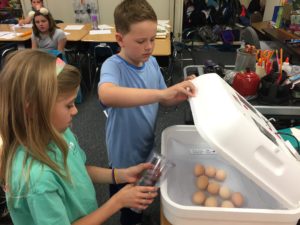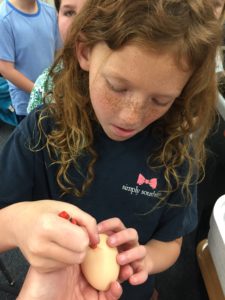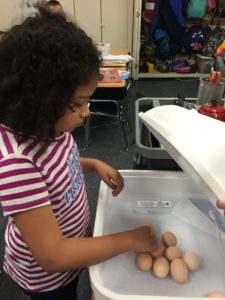4-H Is “EGG-Cellent!”
go.ncsu.edu/readext?521520
en Español / em Português
El inglés es el idioma de control de esta página. En la medida en que haya algún conflicto entre la traducción al inglés y la traducción, el inglés prevalece.
Al hacer clic en el enlace de traducción se activa un servicio de traducción gratuito para convertir la página al español. Al igual que con cualquier traducción por Internet, la conversión no es sensible al contexto y puede que no traduzca el texto en su significado original. NC State Extension no garantiza la exactitud del texto traducido. Por favor, tenga en cuenta que algunas aplicaciones y/o servicios pueden no funcionar como se espera cuando se traducen.
Português
Inglês é o idioma de controle desta página. Na medida que haja algum conflito entre o texto original em Inglês e a tradução, o Inglês prevalece.
Ao clicar no link de tradução, um serviço gratuito de tradução será ativado para converter a página para o Português. Como em qualquer tradução pela internet, a conversão não é sensivel ao contexto e pode não ocorrer a tradução para o significado orginal. O serviço de Extensão da Carolina do Norte (NC State Extension) não garante a exatidão do texto traduzido. Por favor, observe que algumas funções ou serviços podem não funcionar como esperado após a tradução.
English
English is the controlling language of this page. To the extent there is any conflict between the English text and the translation, English controls.
Clicking on the translation link activates a free translation service to convert the page to Spanish. As with any Internet translation, the conversion is not context-sensitive and may not translate the text to its original meaning. NC State Extension does not guarantee the accuracy of the translated text. Please note that some applications and/or services may not function as expected when translated.
Collapse ▲“EGG-stravagant, EGG-citing, and EGG-strordinaire, are just a few words students would use to describe the 4-H Embryology program offered in Caldwell County schools.
In Caldwell County, North Carolina, nearly 300 second graders in 12 classrooms at 7 schools incubate, candle, and watch eggs hatch as part of the 4-H Embryology School Enrichment Program. 4-H provides and delivers incubators and fertilized eggs to classrooms in support of the second grade curriculum, as well as, delivering lessons that fulfill curriculum standards.
Embryology is the study or science of the growth and development of a living thing. In this project, students study the science and development of the chicken embryo.
They observe the embryo growing inside the egg until it hatches into a chick. Students care for the eggs by manually turning the eggs three times a day to simulate the mother hen’s job.

Students are putting water in the bottom tray of the incubator. Humidity is important during the hatching process.
They also measure the temp and humidity of the incubator to create a safe growing environment for the eggs. In addition to caring for the eggs, the students are surprised and delighted to watch their hard work pay off as the chicks emerge from their homes. Students may handle and love on the chicks as they feed and care for them for three days after hatching.
Children have a natural sense of curiosity about living things in the world around them. Building on this curiosity, students can develop an understanding of biology concepts through direct experience with living things, their life cycles and their habitats. Many believe that students learn best through their experiences and interactions with the world. They learn by listening, observing, experimenting and applying their knowledge to real-world situations. 4-H is designed to promote, deliver, and execute this style of learning through the programs we offer.

Student is marking the eggs with an X on one side and an O on the other. This helps us keep track as we turn the eggs.
If you or someone you know is interested in up-coming events, clubs, and summer exploring fun, you can find us online at https://caldwell.ces.ncsu.edu/ or call 828-757-1290 for more information. We would love to have you join our programs that have “EGGs-ponential” value.





